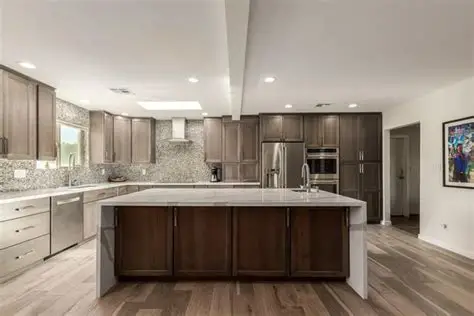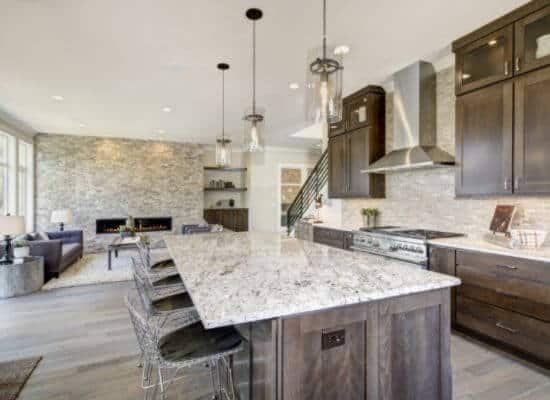Granite is one of the most admired materials in construction, architecture, and home design. Known for its durability and beauty, granite has become a top choice for countertops, flooring, and even wall cladding. But while it’s widely used and appreciated, many people still wonder: Is granite a natural stone? This article explores the origins of granite, its classification, its unique properties, and how it compares to other natural and engineered materials.

Understanding Granite: A Geological Overview
What Is Granite?
Granite is a coarse-grained, light-colored igneous rock composed of quartz, feldspar, and mica. It forms deep beneath the Earth’s crust through the slow cooling and crystallization of magma. This slow process results in large, visible mineral grains, giving granite its distinctive texture.
Is Granite a Natural Stone?
Yes, granite is a natural stone. It is quarried directly from the Earth and cut into slabs or tiles for architectural and decorative use. Unlike engineered materials, granite retains its natural veining, color variation, and mineral composition.
Discover the science behind its makeup: Is granite felsic?

Granite’s Geological Identity
What Type of Rock Is Granite?
Granite is an intrusive igneous rock, meaning it forms below the surface from slowly cooling magma. This makes it a type of natural stone, distinguished by its high silica content and light color palette.
Further reading: What type of igneous rock is granite?
Granite vs Other Natural Stones
Granite is often compared to other stones like:
- Marble (metamorphic)
- Limestone (sedimentary)
- Soapstone (metamorphic)
In terms of durability and maintenance, granite is better than concrete countertops and often preferred over marble for kitchens due to its resilience.
Characteristics of Granite Stone
Physical Properties
- Hardness: 6–7 on the Mohs scale
- Density: ~2.75 g/cm³
- Porosity: Low, especially when sealed
- Color Range: Includes white, black, grey, pink, and green
Granite Geology and Composition
Granite contains a mixture of:
- Quartz – for hardness and sparkle
- Feldspar – for color variety
- Mica – adds depth and contrast
These characteristics of granite make it extremely popular for both residential and commercial use.
Natural vs Engineered Granite
Natural Granite
- Quarried from Earth
- Unique patterns and mineral veining
- Requires periodic sealing
Engineered Granite
- Made from crushed granite mixed with resin
- More uniform appearance
- Often more scratch- and stain-resistant
Though both are functional, natural granite is prized for its authenticity and natural elegance.
Granite Countertops and Home Applications
Popular Uses
- Granite kitchen countertops
- Granite bathroom vanities
- Granite backsplash designs
- Outdoor kitchen surfaces
Color Options
- White granite countertops – timeless and elegant
- Black granite countertops – bold and contemporary
- Grey and speckled patterns – versatile for any decor
Granite Maintenance
- Clean granite countertops regularly with mild detergent
- Sealing granite once a year helps prevent staining
- Repairing chips or cracks is manageable with epoxy or filler kits
Helpful tips:
Cost and Installation
Granite Countertop Cost
Granite prices vary depending on the color, origin, and thickness of the slab. Average ranges:
- Budget: $40–$60/sq ft
- Premium: $100–$200/sq ft
Where to Buy Granite Countertops
- Wholesale granite suppliers
- Stone yards and local fabricators
- Home improvement retailers
Aardwolf Granite Collection
Explore:
- Aardwolf granite countertop collection
- Aardwolf premium granite slabs
- Aardwolf installation services
- Aardwolf granite pricing guide
- Best Aardwolf granite colors
Use lifting clamps to safely move granite slabs.
Comparing Granite to Other Materials
Granite vs Quartz Countertops
- Granite: 100% natural, heat-resistant, unique patterns
- Quartz: Engineered, non-porous, consistent design
Granite vs Marble
- Marble is more porous and delicate
- Granite is tougher and easier to maintain
Granite vs Soapstone
- Soapstone is softer and darker
- Granite offers a wider range of finishes and colors
Conclusion: Granite Is a Timeless Natural Stone
Granite is undeniably a natural stone, admired for its geological origin, beauty, and performance. Whether you’re selecting a new countertop or understanding Earth sciences, recognizing granite’s true nature helps you make better choices in design, durability, and sustainability.
From quarry to kitchen, granite continues to prove its value as one of the most versatile and enduring materials in the natural stone world.

